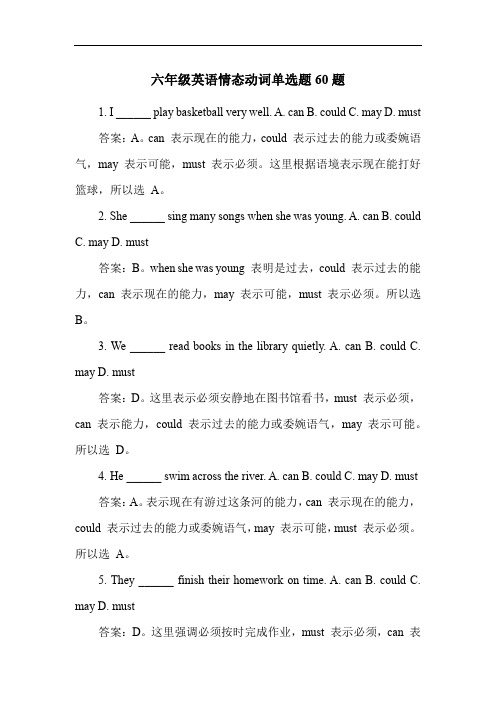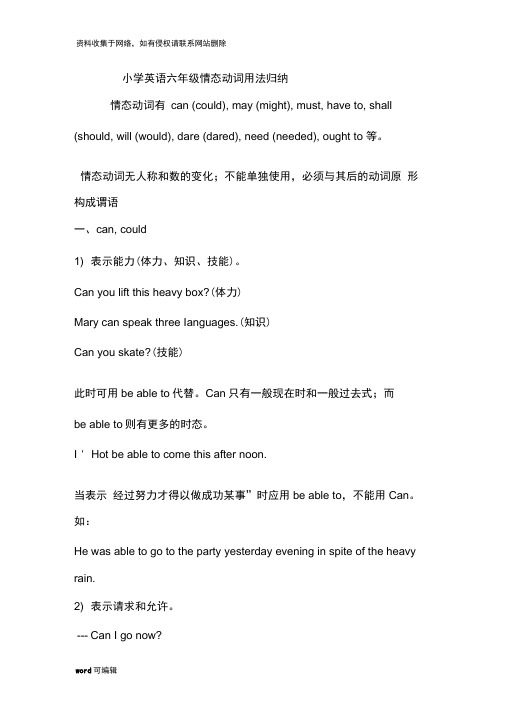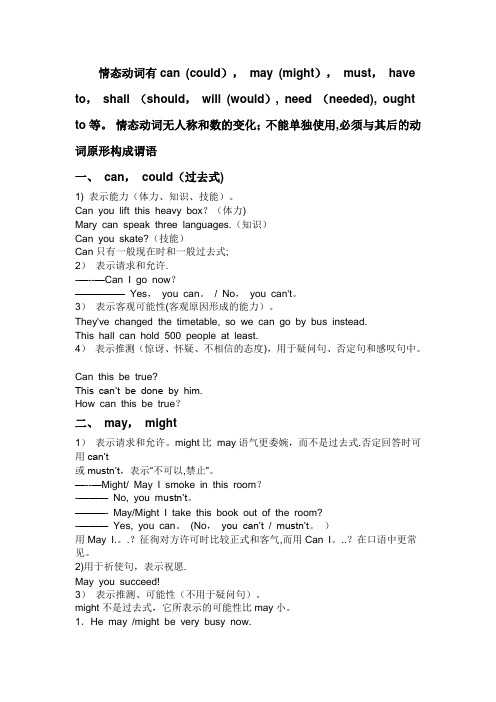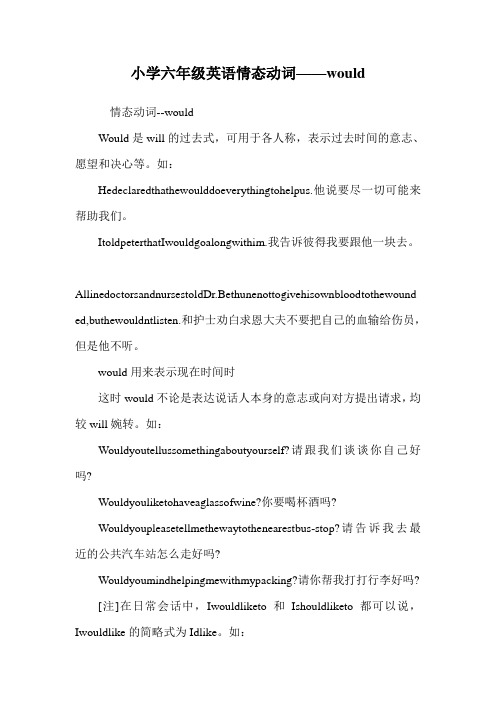六年级英语情态动词
小学六年级can的知识点

小学六年级can的知识点Can 是英语中的情态动词,表示“能够”、“可以”的意思。
在小学六年级的英语学习中,学生需要掌握Can的用法和相关知识点。
下面是对Can的用法及相关知识点的介绍。
一、Can的基本用法Can通常用于表示某人具有某种能力或许可。
1. 表示能力:Can + 动词原形例如:- I can swim.(我会游泳。
)- She can play the piano.(她会弹钢琴。
)2. 表示许可:Can + 主语 + 动词原形例如:- Can I go to the park?(我可以去公园吗?)- Can we watch TV?(我们可以看电视吗?)注意:Can的否定形式为cannot或can't,意为“不能”、“不可以”。
二、Can的疑问句构成Can的疑问句,将Can提到句首,句末加问号。
例如:- Can you swim?- Can she play the piano?三、Can在口语中的常用缩写形式在口语中,Can经常被缩写为'can,即将can的字母o省略。
例如:- I can swim.(正式表达)- I 'can swim.(口语表达)四、Can的其他常用用法除了表示能力和许可外,Can还有其他常用的用法。
1. 表示请求或邀请Can用于表示请求或邀请时,一般用于第二人称。
例如:- Can you help me, please?(你能帮助我吗?)- Can you come to my birthday party?(你能来我的生日派对吗?)2. 表示推测或猜测Can还可以用于表示推测或猜测的意思。
例如:- It can't be true.(这不可能是真的。
)- Can he be late again?(他可能又迟到了吗?)3. Can的过去式Can的过去式为could,表示过去的能力、行为或许可。
例如:- When I was young, I could run very fast.(当我年轻的时候,我跑得很快。
专题11 重点语法知识梳理:情态动词及专练60题(解析版)-六年级英语下学期期末考点大串讲

专题11 重点语法知识梳理三:情态动词及专练60题(解析版)Ⅰ.情态动词一、概论情态动词是一种特殊的助动词,具有下列特征:1. 情态动词具有一定的词义,能表达某种看法;如:can能,may可以,must必须,need需要,等等;2. 情态动词不能单独作谓语,只能和实义动词的原形一起构成复合谓语;如:You can stay here before 5:00 o’clock. 你可以在这呆到五点钟。
We must have a talk right now. 我们现在就必须谈谈。
3. 情态动词无人称变化,即任何事物做主语对情态动词来讲都无变化。
但是情态动词有时态变化。
时态变化会在以后分单词讲解,此处仅以can为例,看看人称对情态动词是否无影响:如:I can dance very well.我舞跳得很好。
He can play basketball pretty well.他篮球打得很好。
I know you can play the piano fairly well.我知道你钢琴弹得很棒。
They all can swim quite well.他们游泳游得相当好。
二、常见的情态动词1.can/can’t,能够/不能① 表示"能、会",指脑力或体力方面的"能力"。
例如:Jim can swim but I can't.吉姆会游泳,但我不会。
① 表示"可能",常用于否定句或疑问句中,指某种可能性。
例如:Han Mei can't be in the classroom.韩梅不可能在教室里。
Can he come here today,please?请问他今天能到这里来吗?① 表示"可以",常用于口语中,指许可或请求做某事。
例如:Can I have a cup of tea,please?请问我可以喝一杯茶吗?You can go out.你可以出去了?① 否定句型为: 主语+c an not(can't/cannot)+动词原形+其它。
六年级英语情态动词单选题60题

六年级英语情态动词单选题60题1. I ______ play basketball very well. A. can B. could C. may D. must答案:A。
can 表示现在的能力,could 表示过去的能力或委婉语气,may 表示可能,must 表示必须。
这里根据语境表示现在能打好篮球,所以选A。
2. She ______ sing many songs when she was young. A. can B. couldC. mayD. must答案:B。
when she was young 表明是过去,could 表示过去的能力,can 表示现在的能力,may 表示可能,must 表示必须。
所以选B。
3. We ______ read books in the library quietly. A. can B. could C. may D. must答案:D。
这里表示必须安静地在图书馆看书,must 表示必须,can 表示能力,could 表示过去的能力或委婉语气,may 表示可能。
所以选D。
4. He ______ swim across the river. A. can B. could C. may D. must答案:A。
表示现在有游过这条河的能力,can 表示现在的能力,could 表示过去的能力或委婉语气,may 表示可能,must 表示必须。
所以选A。
5. They ______ finish their homework on time. A. can B. could C. may D. must答案:D。
这里强调必须按时完成作业,must 表示必须,can 表示能力,could 表示过去的能力或委婉语气,may 表示可能。
所以选D。
6. I ______ ride a bike when I was six. A. can B. could C. may D. must答案:B。
小学英语六年级情态动词用法归纳讲解学习

小学英语六年级情态动词用法归纳情态动词有can (could), may (might), must, have to, shall (should, will (would), dare (dared), need (needed), ought to 等。
情态动词无人称和数的变化;不能单独使用,必须与其后的动词原形构成谓语一、can, could1) 表示能力(体力、知识、技能)。
Can you lift this heavy box?(体力)Mary can speak three Ianguages.(知识)Can you skate?(技能)此时可用be able to代替。
Can只有一般现在时和一般过去式;而be able to则有更多的时态。
I ' Hot be able to come this after noon.当表示经过努力才得以做成功某事”时应用be able to,不能用Can。
如:He was able to go to the party yesterday evening in spite of the heavy rain.2) 表示请求和允许。
--- Can I go now?——Yes, you can. / No, you can' t.此时可与may互换。
在疑问句中还可用could,might代替,不是过去式,只是语气更委婉,不能用于肯定句和答语中。
——Could I come to see you tomorrow?----Yes, you can. ( No, I ' mfraid not.)3)表示客观可能性(客观原因形成的能力)。
They' vecha nged the timetable, so we can go by bus in stead.This hall can hold 500 people at least.4)表示推测(惊讶、怀疑、不相信的态度),用于疑问句、否定句和感叹句中。
六年级英语下册语法特训5情态动词must(含答案)译林版三起

语法特训5:情态动词must〔含答案〕一、must和can辨析must和can都是情态动词。
情态动词不能单独使用,必需与其后的动词共同构成谓语,其后接动词原形。
情态动词本身没有人称和数的变化。
1.must表示必需,否认时表示禁止,语气比拟剧烈。
例如:You must finish your homework now.你现在必需完成家庭作业。
You mustn't cross the road now.你现在不能过公路。
2.must也可以表示说话人的主观推想。
例如:It's seven o'clock.Tom must be at home.现在七点钟。
汤姆确定在家。
3.can通常表示力量〔体力、学问、技能〕,或表示恳求和允许。
例如:The robot can talk.这个机器人能说话。
You can get there by bus.你可以乘公共汽车到那儿。
Can I have some water?我能喝一些水吗?二、must的根本句型1.确定句结构主语十must十动词原形〔十其他〕。
例如:I must spell these new words.我必需拼写这些生词。
2.否认句结构主语十must十not十动词原形〔十其他〕。
must not=mustn't。
例如:You must not/mustn't smoke here.你不能在这里吸烟。
3.一般疑问句结构Must十主语十动词原形〔十其他〕?例如:Must I clean all the rooms?我必需清扫全部的房间吗?Yes, you must./No, ,你必需〔清扫〕。
/不,你不必(清扫)。
留意:must开头的一般疑问句,假设作否认答复,应用needn't或don't have to,而不用mustn't (由于mustn't表示禁止,意为“绝不能〞;而否认答复是想表示没有必要,不是绝不能做某事,所以否认答复用needn't或don't have to)。
小学英语六年级情态动词用法归纳

情态动词有can (could),may (might),must,have to,shall (should,will (would), need (needed), ought to等。
情态动词无人称和数的变化;不能单独使用,必须与其后的动词原形构成谓语一、can,could(过去式)1) 表示能力(体力、知识、技能)。
Can you lift this heavy box?(体力)Mary can speak three languages.(知识)Can you skate?(技能)Can只有一般现在时和一般过去式;2)表示请求和允许.-—--—Can I go now?—————Yes,you can。
/ No,you can't。
3)表示客观可能性(客观原因形成的能力)。
They've changed the timetable, so we can go by bus instead.This hall can hold 500 people at least.4)表示推测(惊讶、怀疑、不相信的态度),用于疑问句、否定句和感叹句中。
Can this be true?This can’t be done by him.How can this be true?二、may,might1)表示请求和允许。
might比may语气更委婉,而不是过去式.否定回答时可用can’t或mustn’t,表示“不可以,禁止”。
—--—Might/ May I smoke in this room?-———No, you m ustn’t。
———- May/Might I take this book out of the room?-———Yes, you can。
(No,you can’t / mustn’t。
)用May I.。
.?征徇对方许可时比较正式和客气,而用Can I。
..?在口语中更常见。
小学六年级英语情态动词——will.doc

小学六年级英语情态动词——will情态动词Will可用于各人称,表示意志、意愿、决心、允诺等。
如:Iwilltry.我愿一试。
Iwilldomybest.我一定尽力而为。
Wewillneverdoitagain.我们永远不会再做此事了。
Whichwillyoufake?你要哪一个?Whowillgowithme?谁愿和我一同去?will在疑问句中用子第二人称时这时句子表示说话人向对方提出请求或询问。
如:Willyoupleaseexplainthesentenceoncemore?请你再把这个句子解释一遍好吗?WillyouhavewesternfoodorChinesefood,Mr.Smith?史密斯先生,你吃西餐还是中餐?Willyoupassmethebutter?请你把黄油递给我好吗?注意下面句中的wont亦表请求:Wontyoucomein?请进来好吗?[注一]在条件状语从句中须用现在一般时表将来,但当will用作情态动词表意愿时,则亦可用于条件状语从句,如Illbegladifyouwillcome.。
[注二]will在下面句子中=Isuppose或probably。
如:Thiswillbetheroomyouarelookingfor.这大概就是你要找的那个房间。
YouwillrememberthestoryItoldyoutheotherday.你们大概还记得我那天给你们讲的那个故事。
[注三]will有时表示一种习惯动作或状态。
如:Waterwillboilat100degreesCentigrade.水总是在摄氏100度煮沸。
Boyswillbeboys.男孩子总是男孩子。
小学六年级英语情态动词——would.doc

小学六年级英语情态动词——would情态动词--wouldWould是will的过去式,可用于各人称,表示过去时间的意志、愿望和决心等。
如:Hedeclaredthathewoulddoeverythingtohelpus.他说要尽一切可能来帮助我们。
ItoldpeterthatIwouldgoalongwithim.我告诉彼得我要跟他一块去。
AllinedoctorsandnursestoldDr.Bethunenottogivehisownbloodtothewound ed,buthewouldntlisten.和护士劝白求恩大夫不要把自己的血输给伤员,但是他不听。
would用来表示现在时间时这时would不论是表达说话人本身的意志或向对方提出请求,均较will婉转。
如:Wouldyoutellussomethingaboutyourself?请跟我们谈谈你自己好吗?Wouldyouliketohaveaglassofwine?你要喝杯酒吗?Wouldyoupleasetellmethewaytothenearestbus-stop?请告诉我去最近的公共汽车站怎么走好吗?Wouldyoumindhelpingmewithmypacking?请你帮我打打行李好吗?[注]在日常会话中,Iwouldliketo和Ishouldliketo都可以说,Iwouldlike的简略式为Idlike。
如:Ishouldliketohavealookatthenewtelevisionset.我想看看这架新电视机。
IdliketoborrowacopyofAliceinWonderland.我要借一本《爱丽丝漫游奇境记》。
Would还可以表示过去习惯发生的动作Ifoundthatretiredpersonswouldoftengototheparktoplaychess.我发现退休的人经常到公园里下棋。
Whenhehadaproblemtosolve,hewouldworkatituntilhefoundananswer.当他有个问题要解决时,他总是想办法一直到找到答案为止。
- 1、下载文档前请自行甄别文档内容的完整性,平台不提供额外的编辑、内容补充、找答案等附加服务。
- 2、"仅部分预览"的文档,不可在线预览部分如存在完整性等问题,可反馈申请退款(可完整预览的文档不适用该条件!)。
- 3、如文档侵犯您的权益,请联系客服反馈,我们会尽快为您处理(人工客服工作时间:9:00-18:30)。
情态动词
Name Score
I believe I can do it best! 我相信我可以做到最好!
Ⅰ.情态动词主要要特征
表示某种情感态度的助动词,不能单独做谓语,有时态(现在时和过去时)变化,但没有人称变化.
Ⅱ.基本用法归纳
1.几个主要情态动词的形式
原形否定形式缩写形式过去时形式中文意思
can cannot= can’t could 能够,能,可以
may may not / might 可能,也许
must must not mustn’t had to 必须,肯定
should should not=shouldn’t / 应该,必须
2.情态动词+动词原形构成句子谓语部分.
He can read. I can dance. We can’t hear you.
3.变问句时:将它与主语换个位.
Can he read? Can I dance? Can’t you hear me?
4.Must发问的句子否定回答较特殊.
Must I clean the room before I leave here?
Yes, you must. 肯定回答
No, you needn’t. 否定回答
5.May发问的句子,表示请求对方允许否.
May I take my turn to try?
Yes, you can./ No, you must not./ can’t.
6.Need一般在否定句和问句中作情态动词中,need发问的句子,肯定回答要用must.
Need we clean the windows? Yes, we must./ No, you needn’t.
7.could, might不仅仅是表示过去时,也表示委婉语气,或不肯定.
Ⅲ.基础练习
1.用恰当的情态动词填空.
(1)The cinema isn’t far from here. So you go there on foot. You go there by bus.
(2)Excuse me, I have a look at that photo?
(3)you work out this difficult problem without any help?
(4)This is a reading-room. You sing here.
(5)I come in? No, you .
(6)The red light is on. We stop.
(7)we hand in the exercises today? No, you . You hand them in tomorrow.
2.选择填空.
(1)—you like some more tea, sir?
—No, thanks.
A.Would B.May C.Must D.Shall
(2)—May I go now?
—No, you , You stay here.
A.needn’t; has to B.mustn’t; have to
C.can’t; must D.needn’t; must
(3)—Must I write all the words down now?
—No, you .
A.mustn’t B.can’t C.won’t D.needn’t
(4)—May I go out and play basketball now?
—No, you finish your homework first.
A.must B.can C.may D.need
(5)You worry about your son. He will get well soon.
A.needn’t B.can’t C.mustn’t
(6)—I come in, Mr. Green.
—Yes, come in, please.
A.Must B.May C.will D.Need
(7)He isn’t in school, I think he be ill.
A.can B.shall C.must D.may
(8)Cars, buses and bikes stop when the traffic lights change to red.
A.can B.may C.must D.need
(9)Henry be at home because he phoned me from the farm just now.
A.mustn’t B.isn’t able to C.may not D.can’t
(10)I have my own room in my house, so I do what I want in it.
A.must B.have to C.need D.can
(11)—Must I go with them tomorrow?
—No, you .
A.mustn’t B.shouldn’t C.needn’t d.can’t
(12)She know the answer, but I’m not sure.
A.maybe B.may be C.may D.must
(13)The city cleaners repeat their work many times a day during the duststorm season.
A.may B.can C.might D.have to
(14)—we go out and play basketball?
—Good idea!
A.Can B.May C.Do D.Shall
(15)You return the book now. You can keep it for another week.
A.needn’t B.mustn’t C.can’t D.won’t
(16)Who’s that woman with Ann?
I’m not sure. It be her mother.
A.may B.can C.will D.must
(17)You to the meeting this afternoon if you have something important to do.
A.needn’t to come B.don’t need come
C.don’t need coming D.needn’t come
(18)John can hardly understand any Chinese, he?
A.can’t B.doesn’t C.can D.does
(19)You play games in this busy street.
A.mustn’t B.neednt’C.won’t
(20)Can you play with a yo-yo, Jim?
Yes, I . It’s easy.
A.must B.can C.need D.may。
